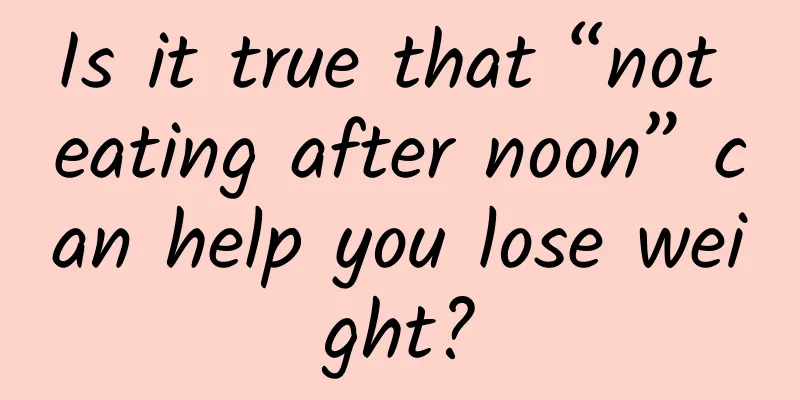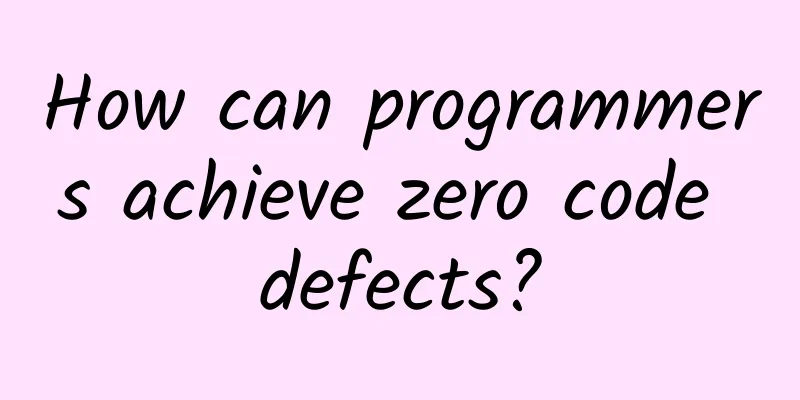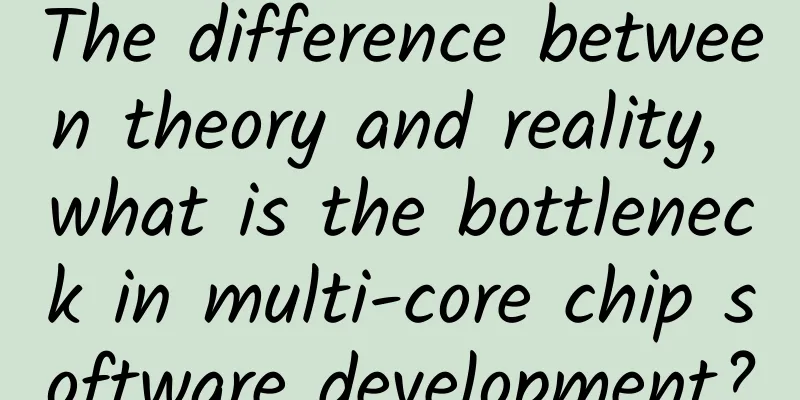Is it true that “not eating after noon” can help you lose weight?

|
Audit expert: Shen Yingjian Director of the Nutrition Department of Hebei Yanda Hospital As the saying goes, food is the first necessity of the people. In ancient times, people believed that the three meals of the day had their own symbolic meanings : breakfast was the food of heaven, and one should obey the will of heaven, not only eating well, but also eating enough; lunch was the food of humans, and one should replenish one's energy after a tiring morning; dinner was the food of ghosts, and at this time, yin was strong and yang was weak, so there was no need to eat. Therefore, not eating after noon became a fixed custom of the ancients. A Western breakfast source: pixabay In modern times, there is also a saying: breakfast is for yourself, lunch is for work, and dinner is for your enemies. Is this saying scientific? Although it is superstition, it may not be without scientific basis. Eating habits play a vital role in a person's health and life span. The ancient custom of “not eating after noon” has been passed down to modern times and has a more scientific and popular name - time-restricted diet or restrictive diet . Studies have shown that restrictive diets extend the lifespan of different species : an article published by European researchers in the journal Nature Aging revealed that limiting daily consumption of specific types of essential amino acids can effectively extend lifespan; an article from Harvard University published online in Cell in 2017 showed that intermittent fasting can prompt mitochondria to maintain a stable metabolic network, slow down cell aging, and thus extend lifespan. Source: pexels Dietary restriction also plays an important role in controlling weight . On April 21, 2022, the team of Professor Zhang Huijie (Department of Endocrinology and Metabolism, Nanfang Hospital, Southern Medical University) published a research paper titled "Clinical Study on the Effects of Calorie Restriction Combined with Time-Restricted Diet and Simple Calorie Restriction on Weight Loss" in the internationally renowned authoritative journal "The New England Journal of Medicine": They randomly divided 139 adult obese patients into two groups, in which the experimental group ate between 8:00 and 16:00 every day and could only drink calorie-free beverages at other times; the control group did not restrict any eating time, and both groups consumed the same amount of energy every day. After 12 months, both groups of patients had effectively lost weight, with the time-restricted diet group losing an average of 8kg from baseline, and the regular energy restriction group losing an average of 6.3kg. The researchers believe that "not eating after noon" as a way of restricting diet can more directly and effectively control the calorie intake of the human body than strictly restricting the calorie intake of three meals, and it is also simple to operate. At the same time, it is also a safe and effective way to manage weight. Source: pexels In addition, a study conducted by the Peking Union Medical College Hospital team on non-obese people showed that not eating after noon can effectively improve metabolic problems. The study compared the effects of time-restricted eating at different time periods on healthy adults and found that eating in the morning (not eating dinner) was more effective in improving blood sugar, reducing weight and inflammation than eating at noon (not eating breakfast), and it could also increase the diversity of intestinal microorganisms. The two time-restricted diet groups were able to effectively reduce energy intake compared to the control group by shortening their eating time. However, there was no significant difference in the energy intake between the two time-restricted diet groups, which suggests that the differences in metabolic health improvements caused by time-restricted diets at different times are not due to differences in energy intake. This suggests that we should choose to eat earlier in the day, that is, skipping dinner is more conducive to metabolism . Source: Screenshot of related papers The Yellow Emperor's Classic of Internal Medicine says: "Overeating will damage the stomach and intestines, and overeating will damage the spleen." In fact, our stomach and intestines are not afraid of hunger, but are more afraid of blockage. On the contrary, being hungry will make us healthier. Generally speaking, we are less active at night and have a lower metabolism. If we eat too much, it will promote the production of large amounts of insulin, and the excess calories will be synthesized into fat, causing weight gain and obesity. If this continues for a long time, it will lead to insufficient insulin secretion, insulin resistance, and even metabolic diseases such as diabetes. If the food for dinner is high in protein, fat, and calories, it will more easily cause fat accumulation and weight gain, which will damage the cardiovascular and cerebrovascular systems and cause high blood pressure, hyperlipidemia, coronary heart disease, fatty liver, Alzheimer's disease and other diseases. Some people may ask, although "not eating after noon" is good for health, for someone who has to eat dinner every day, it is too difficult to suddenly give up dinner, right? I feel hungry after skipping a meal, and I can't sleep at night when I'm hungry, what should I do? Sudden changes in eating habits may bring a lot of discomfort, such as hunger, irritability, decreased concentration, etc. Hot pot source: pixabay According to the tradition of the ancients, people usually stop eating after sunset. However, considering the lifestyle of modern people, experts suggest that you try to advance the dinner time to 5 to 7 o'clock and eat a small amount. It is better to eat a little hungry than to eat 100% full. Do it step by step, and gradually reduce the amount of food you eat at dinner every day. After about a month of exercise, the above discomfort will be reduced a lot. Not eating after noon is not an easy thing, and it is even more difficult to stick to it. During this process, our body's energy supply method will change, and some fat metabolites will be produced. Therefore, we need to drink plenty of water to excrete the metabolites from the body to avoid abnormal internal environment. Vegetable salad source: pixabay However, not eating after noon is not suitable for everyone. The following people are not suitable for not eating after noon: People who are underweight or malnourished; Patients with eating disorders; Adolescents in their growth and development period or women during pregnancy and breastfeeding; Patients with diabetes, chronic diseases such as chronic kidney disease, heart disease, liver disease, etc. and patients with congenital metabolic diseases. If you want to change your eating habits, you must have a full understanding of your health status. If necessary, it is recommended to do it under the guidance of a professional doctor. The "big plan" of health preservation is not a one-day job! |
<<: There are four plants that grow in the desert and have strong vitality. How many do you know?
>>: Why does the spring breeze not reach Yumen Pass? Look at the map and you will see the answer.
Recommend
After finding the black box, how many more steps are needed to analyze the cause of the accident?
The search for the cause of the crash of China Ea...
Risk warnings could not stop Zotye from hitting the daily limit 70 times, but it still failed to find a buyer.
Zotye, the "Porsche" that once relied o...
Super practical event planning and promotion methodology!
Event planning is one of the basic operational ca...
Behind the popularity of smart speakers, domestic manufacturers need to do more than just "ride on the popularity"
The hot battle of smart speakers has spread from a...
Scoping in Android and Hilt
Scoping object A to object B means that object B ...
Where to have tea in Changsha? Tea Club
Contact information for tea drinking: 185-6916-17...
How does a QR code work? What do the black and white squares represent? | Digital Literacy
Audit expert: Jing Yuan, Intermediate Accountant ...
Are bigger planes safer? The higher you fly, the greater the risk? These "10 dark minutes" are a matter of life and death...
Expert of this article: Lin Wenjie, engineer, sen...
I don't allow people who are afraid of injections to not know about nano microneedles!!
The same world, the same kind of "needle pho...
Amid the “retirement wave” of power batteries, who will solve the problem of battery recycling?
The Interim Measures for the Management of Recycl...
It’s a matter of personal safety: How dangerous is it to push too hard when going to the toilet?
One minute with the doctor, the postures are cons...
Amazon's entry into Tmall will affect overseas shopping landscape
Last night, during the Lantern Festival, Amazon C...
Chrysler Pacifica Hybrid: The most fuel-efficient SUV ever
Recently, the U.S. Environmental Protection Agenc...
Fission! Here is a complete guide to WeChat traffic "wool wool"
1. Fission! Fission! In the past six months, fiss...
Bilibili Operation: How does Bilibili operate the UP host group?
1. UP host operation strategy under the pyramid m...









